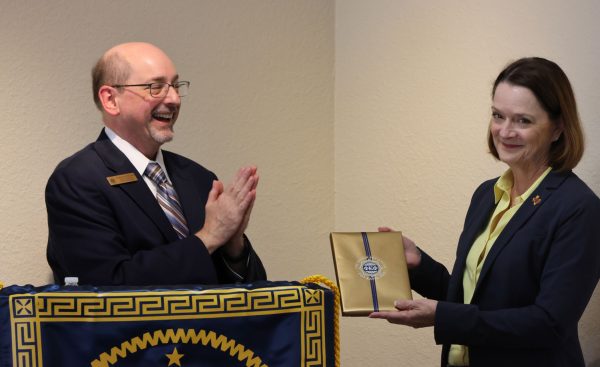Shipley’s “To Go With the One I Love” part three
After translating numerous memoirs by women fleeing Nazism, Suzanne Shipley decides to write a historical fiction with a similar premise, 2022. Photo courtesy of Suzanne Shipley.
Where the drama and racism of part one and two of “To Go with the One I Love” mounted to a frustrating point, part three began the satisfying peel-back on the curtain of the many personalities Shira trusted and readers hated. For those who have been following these reviews, the flippant, selfish Achim has finally done something so bad that Shira no longer has space left to deal with him. His departure from Shira’s traveling group was frustrating to read in part two, but discovering that he had left to romance a woman named Francesca sealed away any feelings Shira had for the pretentious artist. This was among the most gratifying emotional conclusions of these chapters, but remember, this tale of romance is set during the lead up to WWII. Fans of Gray, who has only treated Shira with the reverence and respect she deserves, will be excited to read that his love confession is pushed up a few angsty years thanks to the poisonous spread of the Nazis’ reach and Shira’s insistence that she stay close to her Bubbe. Shira is placed in the position of loving two men at the same time: one who never cared for her and one who has always cared for her. Though her need for time to transition is realistic, it’s difficult not to scream at the pages that it’s time to leave Achim in the dust. It doesn’t become crystal clear that Shira will do this until the latter half of part three, when Achim does it to her first.
After being detained by the gestapo for weeks and dreaming away her worries of Bubbe, Gray saves Shira and Shira finds out that Achim abandoned her. Thus far, readers have been wading through 38 chapters of Shira’s internal monologue being akin to “Achim is terrible to me but I love him anyway, and Gray’s love for me is only brotherly love.” During this part it becomes apparent that the wait for this moment was agonizing. A good pay-off is important, but the writing of Shira and Achim’s relationship never builds to that. It never provides the reader with an opportunity to understand why Shira loves him so much. When he is finally revealed as his true self, there is no surprise. There are superficial qualities that make Achim appealing to Shira, but what the writing truly fails to capture is how enthralled Shira was during their stay in Spain. The reader doesn’t feel the emotions with her, they only feel disgust watching as Shira forgives Achim time and time again for behaving selfishly in their relationship. Were this story for a younger audience, though it absolutely shouldn’t be, the reader may be fooled by Achim’s charm. This almost conclusion of Achim’s part in the story, however, doesn’t shock the adult reader in any sense, but instead makes them question why it took Shira so long to realize his flaws in the first place. Her character is meant to be pragmatic, thoughtful and wise, but we are not shown this in her approach to her relationships. Whether that betrayal of self is intentional, it’s ultimately difficult to read.
Overall, part three was exciting and engaging, but its satisfying end serves to undermine any positive feelings the reader may have had about parts one and two. As the book progresses, it slowly fades from being a pre-WWII book with some romance into a romance book with the tense backdrop of pre-WWII. Whenever the characters don’t have enough to do, sure enough the gestapo finds them and makes things interesting. Though this may be a cold perspective on the purpose of international tension in the book, as focus becomes more and more about which man will sweep Shira off her feet, the historical setting begins to be defined as a vehicle for pushing Shira and Gray together. This is by no means disappointing, and in fact is a very effective part of “To Go With the One I Love.” Shipley’s vast knowledge of France only serves to make it that much more romantic. Where the first two parts of “To Go With the One I Love” had unnatural dialogue and frustrating acceptance of Achim’s actions, part three was a fantastic romp through France and escaping the Reich’s grasp one handsome man at a time.

Hello there! I’m Abigail Jones, your business manager. I’m a mass communication junior with a focus in public relations and advertising. I have a french...









